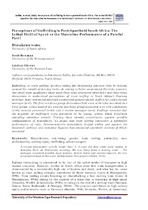Perceptions of staffriding in Post-Apartheid South Africa: the lethal thrill of speed or the masculine performance of a painful past?
Abstract
Staffriding, or train surfing, involves taking life threatening physical risks by moving around the outside of moving trains. In aiming to better understand this risky practice, this small scale qualitative study used three semi-structured interviews and three focus discussions to understand perceptions of train surfing in South Africa’s Gauteng province. Semi-structured interviews comprised general station staff (n=2), and a station manager (n=1). The first two focus group discussions held were with ticket marshals (n= 6 per group, with a total of 12), and the last focus group discussion was with commuters (n=4), security personnel (n=6), and a station manager (n=1). Findings revealed that the majority of staffriders were perceived to be young, urban, black boys/men attending suburban schools. Tracing these identity co-ordinates against possible configurations of masculinity, we argue that train surfing represents a particular performance of risky, heteronormative masculinity forged within and against the historical, political and economic legacies that contoured apartheid versions of ‘black’ manhood.

